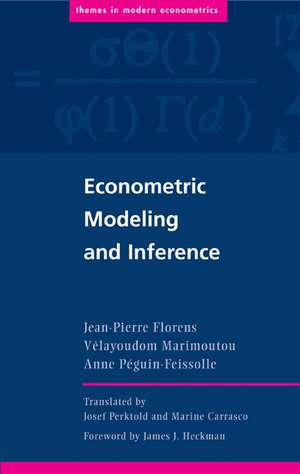Econometric Modeling and Inference: Themes in Modern Econometrics
Autor Jean-Pierre Florens, Velayoudom Marimoutou, Anne Peguin-Feissolle Traducere de Josef Perktold, Marine Carrascoen Limba Engleză Paperback – iul 2007
Din seria Themes in Modern Econometrics
-
 Preț: 273.26 lei
Preț: 273.26 lei - 8%
 Preț: 430.50 lei
Preț: 430.50 lei - 14%
 Preț: 1091.50 lei
Preț: 1091.50 lei -
 Preț: 351.11 lei
Preț: 351.11 lei -
 Preț: 372.21 lei
Preț: 372.21 lei -
 Preț: 452.26 lei
Preț: 452.26 lei -
 Preț: 383.48 lei
Preț: 383.48 lei -
 Preț: 349.80 lei
Preț: 349.80 lei -
 Preț: 288.37 lei
Preț: 288.37 lei -
 Preț: 434.64 lei
Preț: 434.64 lei -
 Preț: 434.12 lei
Preț: 434.12 lei -
 Preț: 421.95 lei
Preț: 421.95 lei - 14%
 Preț: 1012.27 lei
Preț: 1012.27 lei -
 Preț: 348.02 lei
Preț: 348.02 lei - 11%
 Preț: 646.47 lei
Preț: 646.47 lei -
 Preț: 263.32 lei
Preț: 263.32 lei - 11%
 Preț: 447.69 lei
Preț: 447.69 lei
Preț: 319.61 lei
Nou
Puncte Express: 479
Preț estimativ în valută:
61.17€ • 63.62$ • 50.50£
61.17€ • 63.62$ • 50.50£
Carte indisponibilă temporar
Doresc să fiu notificat când acest titlu va fi disponibil:
Se trimite...
Preluare comenzi: 021 569.72.76
Specificații
ISBN-13: 9780521700061
ISBN-10: 052170006X
Pagini: 518
Dimensiuni: 152 x 228 x 25 mm
Greutate: 0.69 kg
Editura: Cambridge University Press
Colecția Cambridge University Press
Seria Themes in Modern Econometrics
Locul publicării:New York, United States
ISBN-10: 052170006X
Pagini: 518
Dimensiuni: 152 x 228 x 25 mm
Greutate: 0.69 kg
Editura: Cambridge University Press
Colecția Cambridge University Press
Seria Themes in Modern Econometrics
Locul publicării:New York, United States
Cuprins
Part I. Statistical Methods: 1. Statistical models; 2. Sequential models and asymptotics; 3. Estimation by maximization and by the method of moments; 4. Asymptotic tests; 5. Nonparametric methods; 6. Simulation methods; Part II. Regression Models: 7. Conditional expectation; 8. Univariate regression; 9. Generalized least squares method, heteroskedasticity, and multivariate regression; 10. Nonparametric estimation of the regression; 11. Discrete variables and partially observed models; Part III. Dynamic Models: 12. Stationary dynamic models; 13. Nonstationary processes and cointegration; 14. Models for conditional variance; 15. Nonlinear dynamic models; Part IV. Structural Modeling: 16. Identification and over identification in structural modeling; 17. Simultaneity; 18. Models with unobservable variables.
Recenzii
'This book is invaluable to researchers and all who are interested in the statistical analysis of time series, microeconomic data, financial and econometric models.' Journal of Applied Statistics
'… this book … make[s] a great contribution to teaching the next generation of theoretical econometricians. … Econometric Modeling and Inference provides an excellent, low- cost opportunity to catch up with what the econometrics subfield has been doing.' Journal of the American Statistical Association
'… this book … make[s] a great contribution to teaching the next generation of theoretical econometricians. … Econometric Modeling and Inference provides an excellent, low- cost opportunity to catch up with what the econometrics subfield has been doing.' Journal of the American Statistical Association
Notă biografică
Jean-Pierre Florens is Professor of Mathematics at the University of Toulouse I, where he holds the Chair in Statistics and Econometrics, and a senior member of the Institut Universitaire de France. He is also a member of the IDEI and GREMAQ research groups. Professor Florens' research interests include: statistics and econometrics methods, applied econometrics, and applied statistics. He is coauthor of Elements of Bayesian Statistics with Michel Mouchart and Jean-Marie Rolin (1990). The editor or co-editor of several econometrics and statistics books, he has also published numerous articles in the major econometric reviews, such as Econometrica, Journal of Econometrics, and Econometric Theory.
Descriere
Presents the main statistical tools of econometrics.
